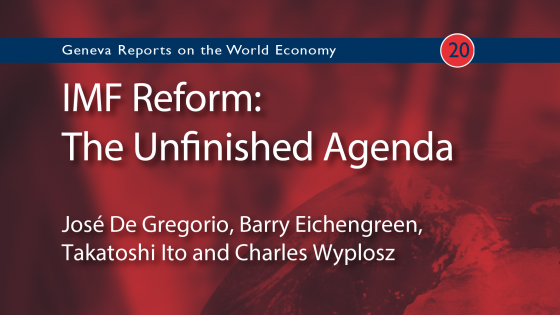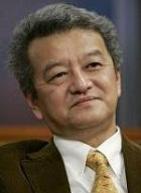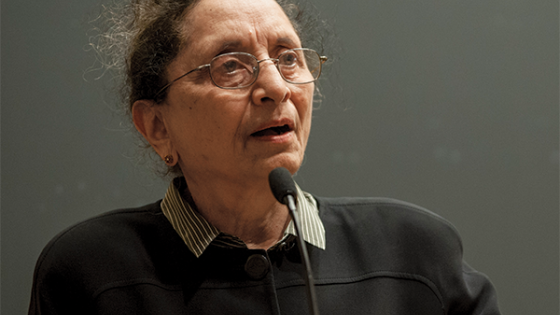Over the last two decades, the world of international finance has changed, and so too has the IMF (e.g. Kenen 2007, Zazzaro and Presbitero 2012). In the latest Geneva Report on the World Economy, a sequel to one written by the same four authors 20 years ago, we highlight seven key developments affecting the monetary and financial environment and their implications for the Fund (De Gregorio et al. 2018).
Download the 20th Geneva Report on the World Economy, IMF Reform: The Unfinished Agenda, here.
Listen to the authors discuss the report in a Vox Talk here.
The world and the IMF have changed
First, global gross capital flows have continued to expand. Although there has been some retrenchment in the most recent decade, gross flows remain double what they were two decades ago.
Second, the growth of cross-border capital flows has been associated with the continued volatility of real and financial activity. Crises have not gone away despite concerted efforts to strengthen markets and policies.
Third, monetary and exchange rate policies have continued to adapt. Additional countries have abandoned exchange rate-based monetary policies in favour of inflation targeting and related monetary policy rules.
Fourth, the international policy community has re-emphasised financial regulation. At the national level, there have been efforts to strengthen microprudential regulation and develop macroprudential policies. At the multilateral level, the IMF has strengthened its financial surveillance.
A fifth development is the accumulation of foreign exchange rate reserves. This movement has been spearheaded by Asian countries, in response to the belief that they were treated badly by the IMF during the 1997-98 crisis. Subsequent efforts by the Fund to offer better alternatives in the form of various flexible and precautionary credit lines have not succeeded.
A sixth development has been bilateral swap agreements among the central banks of the G10 countries plus a few emerging market countries, now matched by the swap lines of the People’s Bank of China. While swap lines helped to restore confidence and stability during the global financial crisis, they represent a break from the principle of multilateralism.
Finally, 20 years ago the IMF was advocating capital account liberalisation and, following the implications of the Mundellian trilemma, the adoption of greater exchange rate flexibility. Yet capital account liberalisation has ebbed and flowed, and managed exchange rates remain as popular as ever.
Resources and alternatives to the Fund
Nor has the perennial question of IMF resources vanished. But some donor countries worry about the moral hazard associated with the availability of large amounts of emergency finance. As a result, while total quotas were doubled in recent years, a commitment to phase out the General Agreements to Borrow (GAB) was extracted as a quid pro quo, and the New Arrangements to Borrow (NAB) may follow.
The rise of regional financial arrangements, it can be argued, has rendered the issue of more IMF resources less urgent. Yet how the IMF should cooperate with Regional Financing Arrangements (RFAs) remains unclear. The Fund has developed a set of principles to guide its relations with RFAs, but these are vague about key points.
We therefore propose that the IMF should negotiate formal agreements with current and future RFAs and consider a binding arbitration procedure to resolve disagreements.
The international monetary and financial system relies heavily for emergency liquidity on bilateral currency swaps provided by a handful of key-currency central banks. Their extension is arbitrary and unpredictable. Better would be an equivalent system of credits disbursed by the IMF itself. We therefore propose a fast qualification procedure, without conditionality, to replace bilateral swaps to countries with robust fundamentals that fall victim to crises.
The China factor
The emergence of China will continue to challenge the world financial order. If its growth rate remains high, China will be entitled to claim the largest IMF quota and, with it, a veto over consequential policy decisions. One question is whether this claim will be granted. Another is what China will do with that power.
If its economic clout is not acknowledged, China may try to create an alternative to the prevailing dollar-centric order. The People’s Bank of China has already extended currency swap agreements with more than 30 central banks in the world. These swap lines promote use of RMB, and once RMB becomes more internationalised they can provide a safety net that rivals the IMF.
Much will depend on market acceptance, which in turn will require China to remove residual restrictions on the currency’s use and on capital flows, as well as implementing steps to enhance financial market liquidity, financial transparency, and the reliability of contract enforcement.
China has also sought to strengthen its influence by creating the Asian Infrastructure Investment Bank (AIIB) and providing development aid bilaterally and through its Belt-and-Road Initiative (BRI). Ideally the World Bank, ADB, and AIIB would share common lending standards, which could also apply to bilateral aid. One way forward would be to offer China membership in the OECD and its Development Assistance Committee (DAC), which seeks to set standards for assistance and to coordinate donors.
Governance reform: Beyond quota revision
The more facilities and resources the IMF possesses, the more important it becomes to strengthen governance of the institution. The status quo under which management answers to the Fund’s principal shareholders makes it hard for the management team to disregard the preferences of the countries with the largest quota and voting shares in the interest of the global good. It makes it hard for management to make time-consistent decisions, for example not to extend exceptional access to countries whose debts are of questionable sustainability, or to bail in politically influential institutional investors.
Yet another effort to rejig quotas and voting shares will not solve these problems. Instead, building on our earlier report (De Gregorio 1999), we propose institutional reorganisation along the lines of a modern central bank. A team made up of the Managing Director and Deputy Managing Directors would make operational decisions concerning, inter alia, programme design and disbursements. Those individual decisions would no longer be subject to the prior approval of a resident Executive Board of governmental representatives. Management would be free to choose its tactics, subject to the mandate spelled out in an amended Articles of Agreement.
The management team would be accountable to a non-resident board or council of high central bank and finance ministry officials, perhaps organised along the lines of the present constituency system, to which it would be obliged to explain and justify its tactics.
With this organisation, selection of the Managing Director and the Deputy Managing Directors would assume greater importance. To ensure their legitimacy, they should be elected by the non-resident Executive Board, or by the governments of member countries, using a weighted voting scheme.
It would be desirable to adopt a voting system with a reasonable degree of proportionality guaranteeing that different regions and economic constituencies were represented by management. The resulting voting system should not be too opaque or complex.
No voting system is perfect, but good systems minimise tactical voting that results in manipulation. One option would be approval voting. Under approval voting, each voter may select a number of candidates. The winner is then the candidate with the largest number of approvals. Following this procedure, the Managing Director and the Deputy Managing Directors would be elected one by one.
Another option would be the single transferable vote. STV delivers proportionality in multi-seat organisations, while limiting wasted votes (votes for sure winners and losers) by transferring them to other candidates, thereby making every voter feel that he had a say and therefore possesses representation. Were selection to occur by STV, there could be a first ballot to select the Managing Director and another ballot to select the Deputy Managing Directors.
References
De Gregorio, J, B Eichengreen, T Ito and C Wyplosz (1999), An Independent and Accountable IMF, Geneva Report on the World Economy 1, ICMB and CEPR.
De Gregorio, J, B Eichengreen, T Ito and C Wyplosz (2018), IMF Reform: The Unfinished Agenda, Geneva Report on the World Economy 20, ICMB and CEPR.
Kenen, P (2007), “IMF reform: a marathon, not a sprint”, VoxEU.org, 30 October.
Zazzaro, A and A Presbitero (2012), “The IMF response to the crisis: Crisis prevention and political influence”, VoxEU.org, 26 June.






